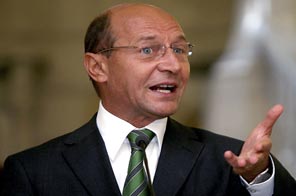Romanian prez proposes unity govt
BUCHAREST: Romanian President Traian Basescu on Wednesday proposed forming a unity government with all parties after Emil Boc's centre-right administration collapsed as the country battles a deep recession.
"I would suggest looking at the possibility of a national unity government," Basescu said at a meeting at the presidential palace with the leaders of all political parties.
He rejected the idea put forward by some parties of an interim government made up of technocrats.
Earlier, the three opposition parties that toppled Boc and his Liberal Democrats via a no-confidence vote on Tuesday nominated Sibiu Mayor Klaus Iohannis as their own candidate to replace Boc.
Basescu, an ally of Boc, declined to comment on the nomination.
Under the Romanian constitution, the president appoints the prime minister after consultation with the parties represented in parliament.
The Social Democrats (PSD), the Liberals (PNL) and the ethnic Hungarian UMD party proposed 50-year-old Iohannis as their candidate.
Iohannis was elected last year for a third term as the mayor of Sibiu, Europe's cultural capital in 2007. He is widely credited with turning the city into one of Romania's most popular tourist destinations thanks to the extensive renovation of its old centre.
Boc's government lost a no-confidence vote on Tuesday after the Social Democrats withdrew from the government in protest at the sacking of one of their ministers.
Romania is already braced for a presidential election on November 22 and the collapse of the government has plunged the country into political crisis as it battles a deep recession.
The ruling Liberal-Democrats (PDL) have said they want Boc to stay as head of government.
All parties seem to agree that an interim government should rule until the presidential election. Basescu started consultations with political leaders on Tuesday, saying he wanted to limit "this period of crisis".
Boc is the first Romanian prime minister to be toppled by a vote of confidence since the fall of the communist regime in 1989.
In parliament, 254 deputies and senators voted to oust Boc and his Liberal-Democrats and 176 voted against.
The vote followed the collapse of the ruling coalition on October 1 when the Social Democrats quit in protest at Boc's decision to sack Interior Minister Dan Nica over vote-rigging allegations.
After the vote, Boc said it was "an honour for a government to fall for pitching reforms aimed at suppressing privileges."
"The crisis will only be resolved once the results of the presidential elections are known," said Ioan Stanomir, professor in political science at Bucharest University.
Even though the three opposition parties have nominated Iohannis as their candidate, Basescu has the final say and he could choose another Liberal Democrat, experts say.
Romania's economy has been one the hardest hit by the global downturn.
The instability could jeopardise crucial economic reforms agreed as part of an international 20-billion-euro (29.5-billion-dollar) bailout led by the International Monetary Fund.
The IMF, the World Bank and the European Union agreed to lend Romania the money in exchange for reforms, including an overhaul of its pension system and pledges to cut the public deficit, which is expected to top 7.3 percent of gross domestic product this year.
Boc also wanted to progressively raise the retirement age to 65 by 2030, up from an average of 63 for men and 58 for women.






